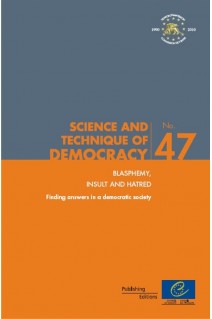



Mutual understanding and acceptance is perhaps the main challenge of modern society. Diversity is undoubtedly an asset, but cohabiting with people of different backgrounds and ideas calls for a new ethic of responsible intercultural relations, in Europe and in the world.This book tries to answer a series of pertinent and poignant questions arising from these issues, such as whether it is still possible to criticise ideas when this may be considered hurtful to certain religious feelings; whether society is hostage to the excessive sensitivity of certain individuals; or what legal responses there may be to these phenomena, and whether criminal law is the only answer.
Foreword
I. Report by the Venice Commission
The relationship between freedom of expression and freedom of religion: the issue of regulation and prosecution of blasphemy, religious insult and incitement to religious hatred
1. Introduction
2. Applicable international standards
3. National legislation on blasphemy, religious insults and inciting religious hatred
4. General remarks
5. Conclusions
II. Council of Europe texts on respect for others' culture and beliefs
European Commission against Racism and Intolerance: General Policy Recommendation No. 7 on National legislation to combat racism and racial discrimination (adopted on 13 December 2002)
Parliamentary Assembly of the Council of Europe: Resolution 1510 (2006) Freedom of expression and respect for religious beliefs
Parliamentary Assembly of the Council of Europe: Recommendation 1 805 (2007) Blasphemy, religious insults and hate speech against persons on grounds of their religion
III. Excerpts from reports presented at the international round-table conference on Art and Sacred Beliefs: from Collision to Co-existence
1. Art and Sacred Beliefs: from Collision to Co-existence
2. Art and religious beliefs: the limits of liberalism
3. An ethics of responsibility for artists
4. Art can legitimately offend
5. Whose responsibility? The case of Iran
6. The intersection between freedom of expression and freedom of belief: the position of the United Nations
7. Blasphemy in the Greek Orthodox legal tradition
8. Blasphemy and justice in a Greek Orthodox context
9. Conflicts between fundamental rights: contrasting views on Articles 9 and 10 of the European Convention on Human Rights
10. Reshaping religion and religious criticism in ultramodernity
11. Conclusions
IV. Appendices to the Report by the Venice Commission
Appendix I: Collection of European national laws on blasphemy, religious insult and incitement to religious hatred
Summary table
Albania
Andorra
Armenia
Austria
Azerbaijan
Belgium
Bosnia and Herzegovina
Bulgaria
Croatia
Cyprus
Czech Republic
Denmark
Estonia
Finland
France
Georgia
Germany
Greece
Hungary
Iceland
Ireland
Italy
Latvia
Liechtenstein
Lithuania
Luxembourg
Malta
Moldova
Monaco
Montenegro
The Netherlands
Norway
Poland
Portugal
Romania
Russian Federation
San Marino
Serbia
Slovakia
Slovenia
Spain
Sweden
Switzerland
"The former Yugoslav Republic of Macedonia"
Turkey
Ukraine
United Kingdom
Appendix II: Analysis of domestic laws on blasphemy, religious insult and inciting religious hatred, on the basis of replies to a questionnaire
Questionnaire
Albania
Austria
Belgium
Denmark
France
Greece
Ireland
The Netherlands
Poland
Romania
Turkey
United Kingdom
Download an extract (1000)

Mutual understanding and acceptance is perhaps the main challenge of modern society. Diversity is undoubtedly an asset, but cohabiting with people of different backgrounds and ideas calls for a new ethic of responsible intercultural relations, in Europe and in the world.This book tries to answer a series of pertinent and poignant questions arising from these issues, such as whether it is still possible to criticise ideas when this may be considered hurtful to certain religious feelings; whether society is hostage to the excessive sensitivity of certain individuals; or what legal responses there may be to these phenomena, and whether criminal law is the only answer.
Please note that in accordance with our terms & conditions, PDF/epubs may only be purchased by private individuals.
